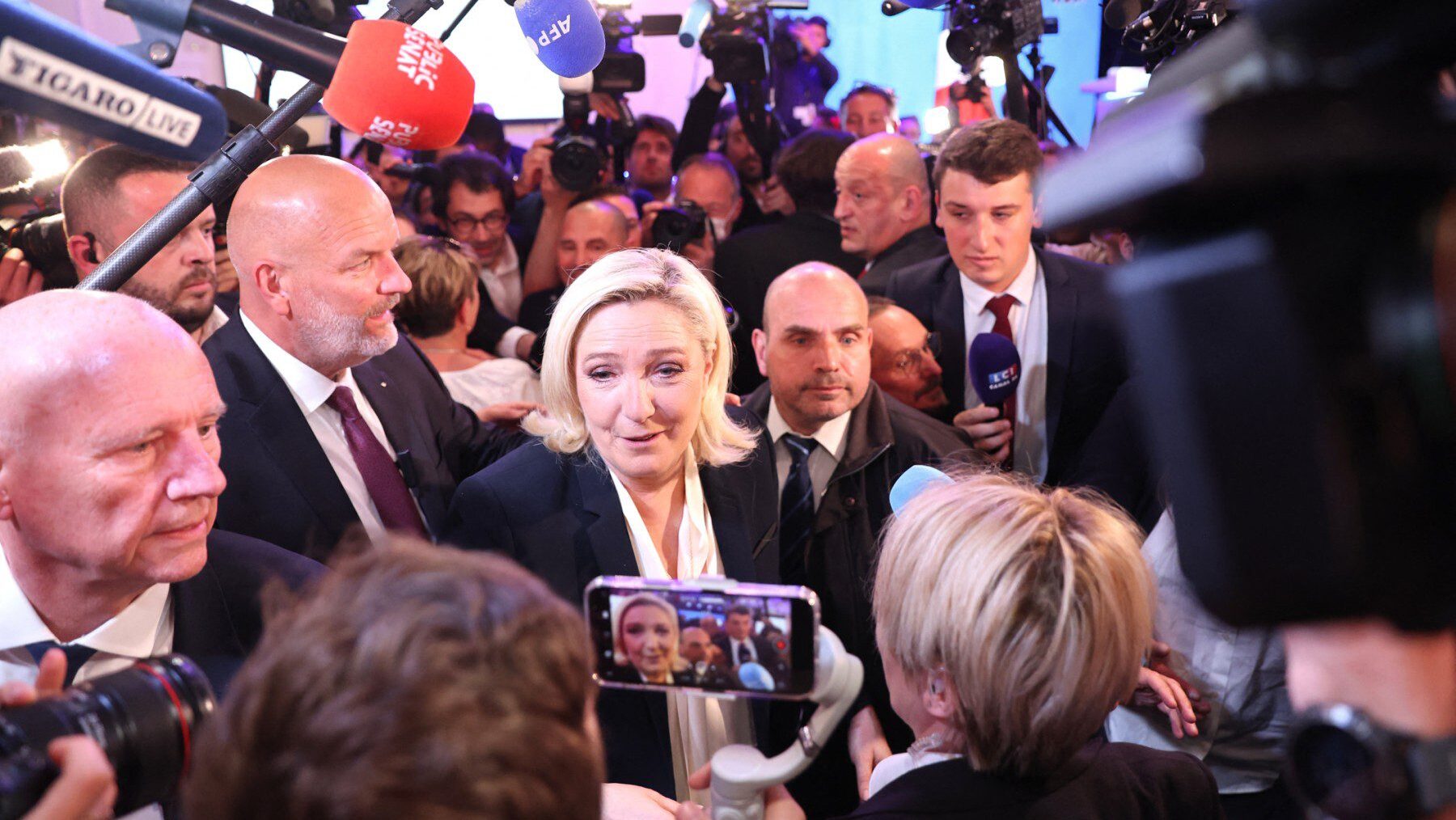
Rassemblement National (RN) presidential candidate Marine Le Pen meets the supporters at the Pavillon d’Armenonville in Paris on April 24, 2022 after the announcement of the first projections by polling firms of the French presidential election’s second round results.
Photo: Thomas SAMSON / AFP
For the first time, a poll suggests Marine Le Pen could win in the second round of the 2027 presidential election and places the Rassemblement National (RN) at an all-time high in public voting intentions. With four months until the European elections, these figures give the media an opportunity to whip up voters against what the Left describes as ‘dangers’ of the national Right party. In fact, Politico did just this in a piece this week entitled “How Le Pen Turned Respectable (and why you shouldn’t be fooled).”
Back in July 2022, shortly after Emmanuel Macron was elected to a second term, political scientist and director of IFOP polling institute Jérôme Fourquet said that the possibility of Marine Le Pen, then president of Rassemblement National, being elected President of the Republic could not be ruled out.
The weekly Valeurs Actuelles commissioned IFOP to conduct a poll exploring a possible victory for the candidate over her two potential rivals, current Prime Minister Gabriel Attal and former Prime Minister Édouard Philippe. Published on Wednesday, February 7th, it projected Marine Le Pen as the winner for the first time against Gabriel Attal, with a narrow 51-49 victory, and in a 50-50 tie with Édouard Philippe.
Jérôme Fourquet observed that the “momentum of the Front is growing with each poll” and now believes that the scenario of a victory for the national Right “has never been so plausible in view of the figures.”
Marine Le Pen is polling at 36% in the first round, the highest score ever achieved in her long political career. Despite the advantage of youth, Gabriel Attal—Emmanuel Macron’s bet to relaunch his five-year term—has not managed to establish himself in terms of popularity and is polling at 22%, i.e., 14 points behind his implacable rival. Behind him, only Jean-Luc Mélenchon, the initiator of the now-dissolved left-wing NUPES coalition (Nouvelle Union Populaire, Écologique et Sociale, or New Ecological and Social People’s Union), managed to climb above the 10% mark.
If we add to Marine Le Pen the predicted score for Éric Zemmour’s Reconquête party (6%) and that obtained by the sovereigntist Nicolas Dupont-Aignan (2.5%), the bloc of the national Right is close to 45% in the first round—again, an unprecedented level of support in a French opinion poll.
The Rassemblement National’s score in the polls has been climbing steadily for several months, boosted by resistance to pension reform, the riots of June 2023, and the terrorist attack that led to the death of Professor Dominique Bernard against the backdrop of the Israeli-Palestinian war in October. Since the beginning of 2024, the Crépol tragedy, followed by the disputed vote on the immigration law and finally the farmers’ revolt have helped to further strengthen the party now led by Jordan Bardella, which appears more than ever to be the only credible alternative political force to Emmanuel Macron on the subjects of security and immigration.
Despite a significant increase in the number of retired people and higher-income voters supporting them, the Rassemblement National is still struggling to win over a large proportion of these population groups, which are nonetheless decisive if it hopes to win, and which still form the basis of Macron’s electorate. Retired people would only overwhelmingly support Marine Le Pen if she were to face the far-left Jean-Luc Mélenchon in the second round. In this configuration, 70% of the well-off and 81% of retirees would be prepared to vote for her. 66% of supporters of Renaissance, Emmanuel Macron’s party, would also prefer to put a “Le Pen” ballot in the box rather than see the far Left triumph.
This is another of the lessons from these polls: the so-called ‘republican respectability,’ which used to be a weapon to push the Rassemblement National out of the field of French political life, now includes the party that has firmly established itself in the country’s parliamentary life since the 2022 legislative elections, which enabled it to form a group of 88 MPs. It is now Jean-Luc Mélenchon’s supporters who are increasingly being branded as infamous, not least because of their open support for Hamas terrorists.
Nevertheless, these figures should be treated with extreme caution. Three years still separate the French from the next presidential election, and experience shows that, on many occasions in recent years, the Rassemblement National’s scores in the polls have been predicted to be much higher than they actually were at the finish line.
In any case, the publication of such forecasts enables the RN’s opponents, led by Emmanuel Macron, to make the prospect of an RN victory palpable and real, in order to mobilise the entire electorate against the danger of a rise to power by the party that a large part of the press continues to describe as ‘the far Right.’
In his press conference on January 16th, Emmanuel Macron denounced the Rassemblement National as the “party of collective impoverishment,” “lies,” “transformism” and “easy anger.”
